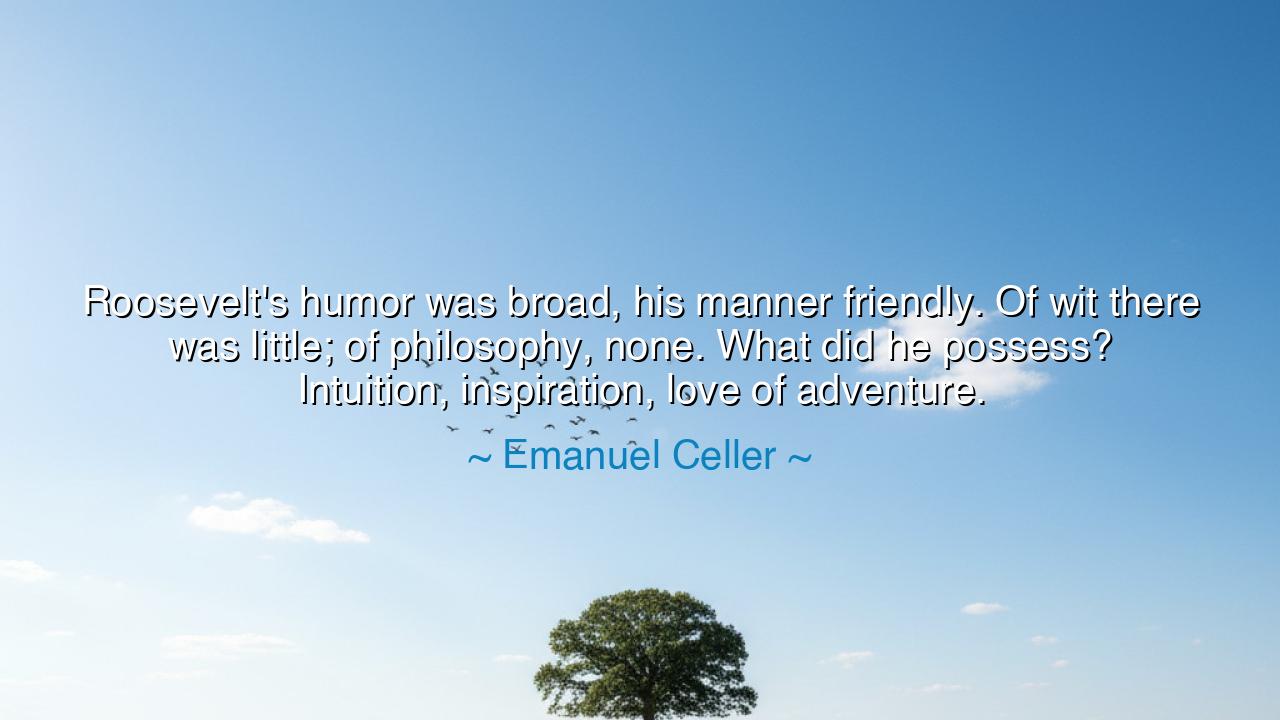
Roosevelt's humor was broad, his manner friendly. Of wit there
Roosevelt's humor was broad, his manner friendly. Of wit there was little; of philosophy, none. What did he possess? Intuition, inspiration, love of adventure.






"Roosevelt's humor was broad, his manner friendly. Of wit there was little; of philosophy, none. What did he possess? Intuition, inspiration, love of adventure." These words, spoken by Emanuel Celler, speak to the essence of a man who, though lacking in conventional wisdom and intellectual profundity, embodied something far more powerful—a spirit that could not be contained, a force that would shape the course of history. It is said that true greatness lies not in the mastery of words or the depth of thought, but in the ability to inspire others to action, to lead with heart, and to embody the qualities that awaken the spirit of the people. Roosevelt may not have been a philosopher, but in his boldness, in his sense of adventure, and in his innate ability to feel the pulse of the world, he was, indeed, a man of profound wisdom.
In ancient times, there were those who rose to power not because of their learning, but because of their instincts, their ability to understand the world around them without the need for deep reflection. Take, for instance, Alexander the Great, who, though a student of Aristotle, was not led solely by philosophy, but by an irresistible drive for conquest. Alexander’s success came not from his profound intellectual musings but from his boundless courage, his sharp instincts in battle, and his unwavering belief that the world was his to conquer. Like Roosevelt, Alexander was a man who thrived not in the halls of academia but on the battlefield of life, where intuition and inspiration shaped the future more than any written doctrine.
And so it was with Roosevelt. Emanuel Celler’s words, though seemingly simple, reveal a deeper truth—that Roosevelt was not a man of high intellectual pursuits, but one of raw, untamed energy. His humor, though broad, was a means of connecting with the common people, of making them feel as though they too could partake in the grand experiment of American life. It was through his humor that Roosevelt built bridges with those he sought to lead, using his charm to win hearts and his instinct to guide his actions. He understood, as few men have, that leadership is not merely about the ability to think deeply, but about the ability to move people, to spark in them the fire of hope and purpose.
Consider, for a moment, the story of Winston Churchill, who, like Roosevelt, led his people through tumultuous times. Churchill’s brilliance was not in his philosophical dissertations, but in his ability to inspire a nation in its darkest hour. His speeches, his courage, and his steadfast refusal to surrender were grounded not in scholarly pursuits but in his profound sense of duty and intuition. Like Roosevelt, Churchill did not rely on intellectualism, but on the ability to feel the weight of the moment and act decisively, inspiring others to follow. Both men understood that true leadership is born not from the mind alone, but from the spirit—the ability to inspire, to connect, and to act with vision.
Roosevelt’s sense of adventure was another cornerstone of his leadership. The call to adventure is a call to growth, to embracing the unknown with open arms, knowing that the challenges faced along the way will shape the future in ways unimaginable. His decision to take on the role of president during a time of deep national crisis was itself an act of adventure—a daring leap into the unknown, armed with nothing more than his instinct and an unwavering belief that change was not only necessary, but possible. Roosevelt did not shy away from the uncertain; he welcomed it, recognizing that the path to greatness was never one of comfort.
The deeper lesson here is clear: philosophy and wit are not the only measures of a person’s worth or greatness. Roosevelt’s intuition and inspiration remind us that action and courage often speak louder than words. What Roosevelt possessed was a profound understanding of the human spirit, an innate sense of what people needed, and the ability to act on that knowledge without the paralysis of overthinking. In a world where intellectualism often takes precedence, Roosevelt’s legacy teaches us that action, driven by instinct and heart, is the true path to transformative change.
In our own lives, the lesson we must take from Roosevelt is the importance of trusting our own intuition, of embracing the adventure of life, and of moving forward with inspiration even when the road is unclear. We are often faced with moments of indecision, where the mind seeks answers in the form of reason and logic. Yet, it is in these moments that we must remember Roosevelt’s wisdom: sometimes, it is not the greatest thinkers who change the world, but the brave souls who trust their instincts and act with passion. To live with courage, to lead with heart, and to never shy away from the unknown—this is the legacy of true leadership.
So, in the coming days, let us not be bound by the confines of logic alone. Let us embrace our intuition, let us seek the adventure that lies beyond our comfort, and let us act with the inspiration that comes from within. In doing so, we will carve our own paths to greatness, guided not by the weight of philosophy, but by the strength of spirit and the fire of purpose.






AAdministratorAdministrator
Welcome, honored guests. Please leave a comment, we will respond soon